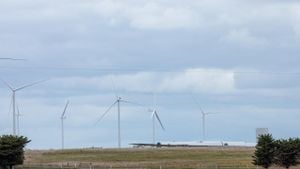Across the globe, as nations grapple with the pressing necessity to transition from fossil fuels to renewable energy sources, they are confronted with significant challenges. These challenges shape the debates surrounding energy transition strategies, with proponents and critics voicing starkly different views on how best to proceed. While some argue for immediate and complete shifts to renewables, others caution against hasty changes, predicting dire consequences for economies and communities.
Take New Zealand, for example. Gerard Dale, a partner at Dentons, warns against rushing the renewable transition, stating, “We need to plan the transition to renewables, and plan it well. If we don’t, we’ll get price shocks, and I think we’re starting to see those now.” He highlights the impact of rising energy costs, pointing out significant electricity price hikes. For industrial businesses dependent on stable energy prices, the situation could become untenable. Dale adds, “It’s not a surprise our pulp and paper mills are struggling. We need to transition without leaving our rural communities behind.”
Similarly, Africa's renewable energy evolution faces obstacles, as nations rich with resources like solar and wind are struggling to secure the financial backing necessary to realize their potential. Despite holding 60% of the world's best solar resources, Africa only accounted for 2% of global renewable financing last year, stresses the International Energy Agency. At the inaugural Accelerated Partnership for Renewables Investment Forum held recently, which gathered government ministers, investors, and developers, the chief topic was the urgent need for innovative financing solutions. Discussions highlighted how the costs linked to energy project development could be more manageable with the right financial and technical support.
During the forum, numerous encouraging success stories emerged, illustrating how strategic investments could not only yield financial returns but also provide social benefits for communities. For example, IRENA Director-General Francesco La Camera stated, “The success of global climate objectives is intrinsically linked to Africa realizing its vast renewable energy potential.”
The gravity of financial constraints was echoed by participants who underscored the urgency for unique financing structures to support the renewable energy movement. They expressed hope for increased collaboration and strong international partnerships to address these financing challenges. "Finance, finance, finance; we cannot emphasise it enough,” Ahmed Badr from IRENA recounted, emphasizing the key role of investments.
These discussions are particularly relevant considering the backdrop of global climate conferences such as COP29, setting the stage for potential financial commitments and frameworks aimed at bolstering renewable initiatives.
On the other side of the globe, the energy transition discourse reveals concerns similar to Africa's, as nations rush to address climate change. Many experts argue the energy transition should factor inclusivity and equitable practices for Indigenous communities, which have often been sidelined under the pressure of resource extraction. For example, there have been numerous protests from Indigenous groups against lithium mining efforts, which threaten local ecosystems across regions like northern Chile and Nevada. The rapid extraction of energy transition minerals, heralded for their role in renewable technologies, reflects previously unjust practices linked to fossil fuels.
Deep Jigneshkumar Parekh from Canada's National Observer captures this sentiment poignantly: “Each transition, though hailed as progress, has inflicted fresh waves of environmental harm, displacement, and disregard for Indigenous rights.” The need for collaborative models, where Indigenous communities play integral roles as partners, is increasingly pressing.
Interestingly, amid these global challenges, some analysts maintain an optimistic outlook on the renewable transition. Many suggest the costs associated with the energy transition could be less burdensome than previously anticipated. According to recent reports, estimates on energy requirements have often been overstated, with technological advances offering potential for more affordable solutions. The Economist flags these optimistic projections, urging more confidence in the market's ability to adapt.
Yet, the rising costs linked to energy transition disputes present real risks. The Law360 publication discussed how companies may brace themselves for increasing legal disputes rooted in clean energy policies. The involved legalities reflect how contested energy landscapes can disrupt market activities, frequently hindering progress rather than facilitating it. Rising litigation costs add another layer of complexity to the transition.
Despite the multitude of hurdles, stakeholders remain committed to achieving feasible and sustainable energy systems worldwide. According to the International Energy Agency, governments accounting for about 70% of global energy demand are ramping up policies to improve energy efficiency, recognizing its immense potential to contribute to climate goals. For every percentage point increase in efficiency, emissions can be significantly curtailed.
Striking the balance between immediate action and long-term feasibility will undoubtedly fuel debates going forward. A future where clean energy meets socio-economic needs without sacrificing environmental integrity is what those within the space strive for, but achieving this requires nuanced and thoughtful approaches.
Engaging with the questions of how to navigate the transition, whether it be through fostering inclusive practices or ensuring financial backing, remains pivotal. The challenge isn't just about generating energy; it involves rethinking relationships—between stakeholders, communities, and cultures—ushering the conversation toward sustainable practices made tangible through cooperation and innovation.
The overarching narrative surrounding the energy transition is one of urgency and complexity. From the financially constrained projects of Africa to the rising costs faced by agricultural communities in New Zealand, the message rings clear: collaboration, innovative financing, and inclusive models are non-negotiable elements of the renewable agenda. The vision of transitioning to renewables hinges on crafting practical solutions, recognizing unique needs and leveraging strengths drawn from diverse global perspectives.
Moving forward, it will be imperative to listen, adapt, and act collectively, ensuring equity takes center stage as nations embrace the path toward sustainable energy futures.



